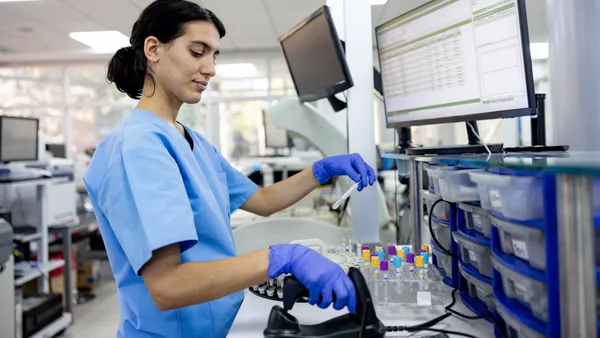Dive Brief:
-
The Biomedical Advanced Research and Development Authority (BARDA), awarded a $6 million contract to Inflammatix to advance development of a test to distinguish between bacterial and viral infections, it announced Thursday.
-
Currently, physicians may struggle to determine the nature of infections, leading antibiotics to be used in patients with viral infections and withheld from people with bacterial infections.
-
Inflammatix wants to end this uncertainty by developing a test that analyzes the immune system to quickly determine whether it is dealing with a bacterial or viral infection.
Dive Insight:
The similarity between the symptoms of bacterial and viral infections makes it hard for physicians to determine how to treat some patients. Some physicians choose to administer antibiotics despite the uncertainty, leading to reports that antibiotics are significantly overprescribed in children with acute respiratory tract infections. Overprescribing raises the risk of antibiotic resistance, which has been linked with thousands of deaths.
Conversely, other studies show that a significant minority of patients with bacterial infections have to wait longer than is recommended to receive antibiotics. These delays are associated with negative health outcomes including death.
BARDA wants to prevent both the over and underuse of antibiotics by equipping physicians to quickly differentiate between bacterial and viral infections. To advance that goal, the HHS office has awarded a contract to Inflammatix.
The 14-month, $6 million cost-sharing contract will support work on Inflammatix's HostDx Fever test. The blood-based diagnostic analyzes immune system gene expression patterns for signs of whether a patient is fighting a bacterial or viral infection. Inflammatix expects the test to produce results within 30 minutes.
BARDA has an option to extend the contract through to 2027. The provision of a further $64.9 million over that period could allow Inflammatix to gather the evidence FDA will want to see before clearing the test for use in the U.S.
Other companies are working on other technologies designed to differentiate between bacterial and viral infections. MeMed, for example, has a test that analyzes levels of the immune system proteins TRAIL, IP-10 and CRP to determine the nature of an infection. A 2017 study linked the test to 93.8% sensitivity and 89.8% specificity. The test is already available in Europe as an ELISA kit.
MeMed and Inflammatix are both working to apply their technology to challenges other than the differentiation between bacterial and viral infections. Inflammatix's other two tests are designed to determine the risk of sepsis and improve influenza testing.











